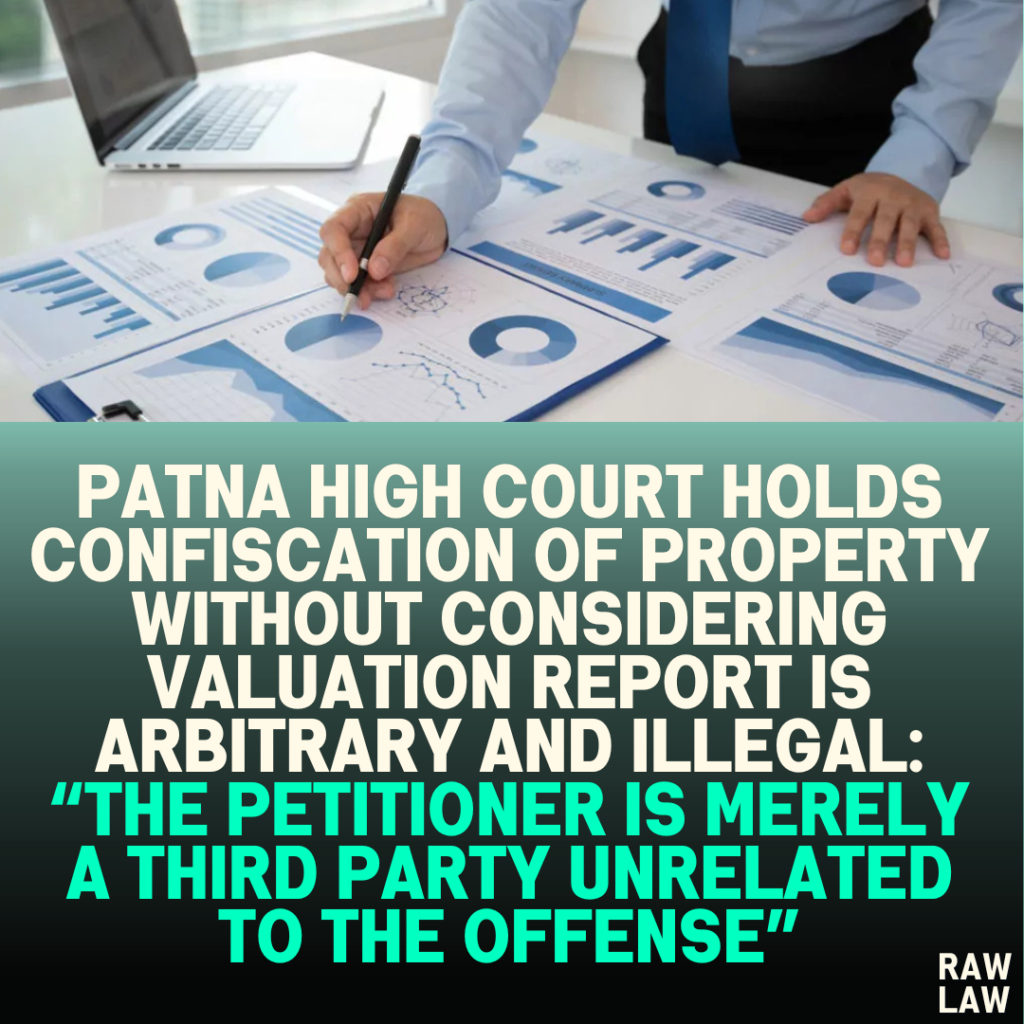Court’s Decision:
The Patna High Court set aside the orders of the Excise authorities related to the confiscation of the petitioner’s property under the Bihar Prohibition and Excise Act, 2018, citing arbitrary valuation and lack of consideration of crucial facts. The court quashed the orders dated 16.08.2022, 12.06.2023, and 15.01.2024 and remanded the matter to the Collector-cum-District Magistrate for fresh consideration, directing the petitioner to file a new application.
Facts:
- The petitioner filed the writ petition challenging the order dated 16.08.2022 passed by the Collector-cum-District Magistrate, Rohtas in Excise Confiscation Case No. 20/2022, confiscating the petitioner’s house under construction.
- The order was based on an incident on 21.01.2018, where 55.080 litres of foreign liquor were seized from a shop on land partly owned by the petitioner.
- The petitioner’s property was seized on the allegation that the shop was used for illegal storage of alcohol by third parties.
- The petitioner appealed against the confiscation order, which was rejected by the Excise Commissioner and subsequently by the Excise Secretary without consideration of the valuation report prepared by the Circle Officer, Karghar.
Issues:
- Whether the confiscation of the petitioner’s house was justified under Section 58(ii) of the Bihar Prohibition and Excise Act, 2018.
- Whether the valuation of the property at Rs. 20,00,000/- was arbitrary when the Circle Officer’s report assessed it at Rs. 1,80,000/-.
Petitioner’s Arguments:
- The petitioner argued that the authorities failed to consider the valuation report of the Circle Officer, which assessed the value of the land at Rs. 1,80,000/- per decimal.
- The confiscation was made without any proof of the petitioner’s involvement in the alleged illegal activities.
- The petitioner contended that only 1 decimal of the land belonged to him, while the remaining part was owned by co-sharers who were not party to the alleged crime.
Respondent’s Arguments:
- The respondents argued that the seizure was justified as the property was used for illegal storage of alcohol, which violates the prohibition policy of the state.
- The respondents supported the valuation of Rs. 20,00,000/- as determined by the Sub-Registrar and argued that the petitioner’s involvement was inferred from the location of the seized items.
Analysis of the Law:
- Section 58(ii) of the Bihar Prohibition and Excise Act, 2018, allows for the confiscation of property used in the commission of an offense.
- Section 32(3) presumes guilt if property is used for the offense unless satisfactorily accounted for by the owner.
Precedent Analysis:
The court referred to its earlier decisions on confiscation under the Bihar Prohibition and Excise Act, emphasizing that any order for confiscation must be passed with due consideration of all facts and circumstances, including the economic impact and ownership of the property.
Court’s Reasoning:
- The High Court held that the authorities acted arbitrarily in disregarding the Circle Officer’s valuation and failing to distinguish between the petitioner’s ownership and the alleged offenders.
- The court found that the confiscation was illegal as the petitioner was merely a co-owner and was not named in the police reports or Fardbeyan.
- The petitioner’s house was only a part of a hospital building, and there was no evidence that the petitioner was involved in the illicit storage of alcohol.
Conclusion:
The High Court quashed the confiscation orders and directed the Collector-cum-District Magistrate, Rohtas, to re-assess the matter based on the Circle Officer’s report. The petitioner was given liberty to file a fresh application for release of the property.
Implications:
This judgment underscores the importance of considering all relevant facts and valuation reports before issuing confiscation orders under the Bihar Prohibition and Excise Act. It reinforces the protection of property rights against arbitrary state action and ensures that third parties not involved in the offense are not penalized unjustly.



